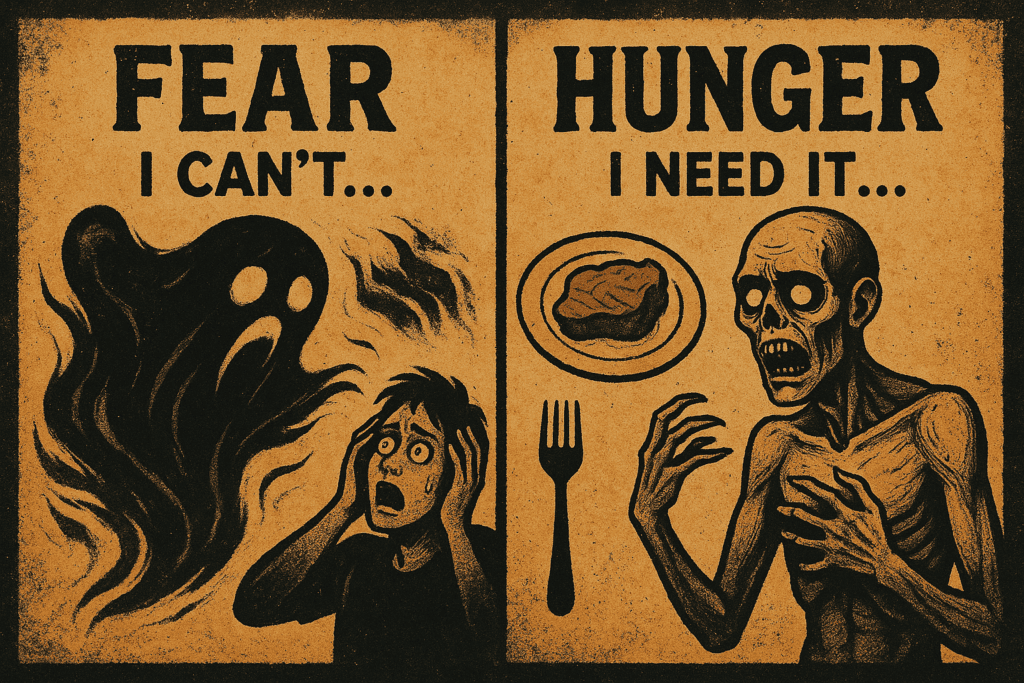
Primal feelings…
Fear and hunger…
Both are things we feel strongly but never really think deeply about — or fully comprehend how much they influence our actions.
I mean most of us understand that those feelings play a role in the things we do.
But…
When you get down to the nitty gritty — you start to understand they drive everything we do.
Seriously — to really drive it in (no pun intended):
Everything we do is influenced by either fear or hunger.
From what and who we interact with, to what we pursue and achieve.
There are other primal feelings to factor in of course, but…
What really pauses you and forces you?
That is the question we’ll be attacking.
Together — let’s figure out…
Fear & Hunger: What They Really Are
If we want to be simple, fear is being scared, and hunger is wanting to eat.
Boom — we’re done.
No, but really, let’s break them down:
Fear is inability, paralysis, hesitation — things that either have or keep you still.
Hunger is inescapable want, obsession, something ceaseless — you need to get it, whatever it is, no matter what, to quell.
Fear can be a bad mindset, bad memories, imposing forces, the unknown…
Psychology Today pushes that fear stems from perceived danger — physical or emotional. It is hardwired into us for survival.
Hunger is a bit more nuanced though.
It can either be literal or symbolic.
In a more common or literal sense — hunger is the distress accompanied by the lack of food.
But symbolically…
Hunger is the state of being empty and aiming to fill up that emptiness.
A lack of food, purpose, community, and more could fuel the feeling that is hunger.
The symbolic definition is more of what we’ll be leaning into.
Now though, the focus will be upon:
The Role Of Fear
Have you ever thought about why you felt fear at a certain moment?
Negative experiences from the past creeping into the mind, maybe?
The potential of loss, maybe?
Good ole impending doom?
Any one of those possibilities could fuel fear in anyone — and rightfully so.
I believe the role of fear is rooted in security:
It appears whenever harm is a probability regarding a situation (or person) — I’ll explain it like this:
Without fear making itself known — before, during, or after a potentially harmful situation — we would all be none the wiser about pain, be it physical or mental.
The feeling arises to protect you.
Our fears may differ, but they universally aim for the same thing.
Even though fear is rooted in security and aims to protect, it isn’t always helpful — in fact, it could be detrimental if allowed to build.
That might sound strange, but think about it…
Your fear may prevent you from harm due to a variety of things, but if you allow it to guide your decisions, it’ll undoubtedly keep you complacent.
In simpler words…
Listening to fear will prevent you from taking risks, risks that could develop you and change you — for better or worse.
The role of fear is to protect you, but it could also be something you need to be protected from.
What do I mean by that?
Fear Sells…
We’ve all heard that phrase — and honestly, it’s true.
It’s a primal feeling, we cannot ignore without consequence, that influences our decisions.
Being aware of that is crucial.
Your fears may be justified, but don’t let that dictate your decisions — because it’ll keep you from moving forward.
And that’s not good at all — even if it’s for security’s sake.
With that said:
If taking action is something you struggle with, either due to fear or just in general, check out my first blog post about getting out of a rut.
Fear is positive and negative.
You shouldn’t ignore it, but letting it guide you — regardless of what it’s rooted in — is unsustainable.
Now…
Let’s get into that other feeling I mentioned.
The Role Of Hunger
I love being hungry.
No seriously.
Being hungry motivates me.
A good meal — motivating.
Developing an interest — motivating.
Many would say only one of those two things relates to hunger.
I beg to differ.
No matter how you spin it — being empty and wanting to fill it is hunger.
The feeling may be widely associated with food — but it can and does mean so much more.
To get a bit personal — I find that the times where I’ve found the most growth and achievement in my life were preceded by periods of emptiness:
No community.
No goals.
No purpose.
Quite literally water fasting.
The lack of those things in my life made me hungry for them — so hungry that I’ve been relentlessly pursuing them for years now.
Periods of content usually have me not doing…
Well… anything really.
I think that’s why hunger is so fundamental and primal — it drives you out of unsustainable states.
But only if you allow it to push you.
I find that “overfeeding” your hunger leaves you aimless or lethargic (lacking energy).
There’s a real balance you must find in allowing hunger to exist — to drive you — and also satisfying the feeling enough to where you can bear it, but you’re not content.
And that leads us into our next section:
Feelings Can’t Be Destroyed, Just Changed
The feelings — fear and hunger — will never disappear.
We’ll have to deal with them our whole lives — and that’s it:
Deal with them.
Ignoring your fears would be irresponsible and potentially ruining.
Ignoring your hunger could be life-threatening — in both the literal and symbolic sense.
But allowing those feelings to do as they will with you is not a path you should invest in.
What you should do is face them — head-on and with intention.
You can’t destroy them.
But…
With mindfulness at play, when they appear, they can be changed — or even better:
Converted.
Dealing with fear?
Face it with optimism and adaptability — to convert it into courage and results.
Dealing with hunger?
Attack it with temperament and intention — to convert it into energy and strategy.
A clear mindset toward these primal forces is what gives you the upper hand.
It’s Up To You
You already know what fear feels like.
You already know what hunger feels like.
Now the question is — are you going to let them dictate your life…
Or are you going to face them?
You can’t destroy them.
But you can turn them into fuel.
It’s up to you.
Be aware.
Be intentional.
Move on your terms.
